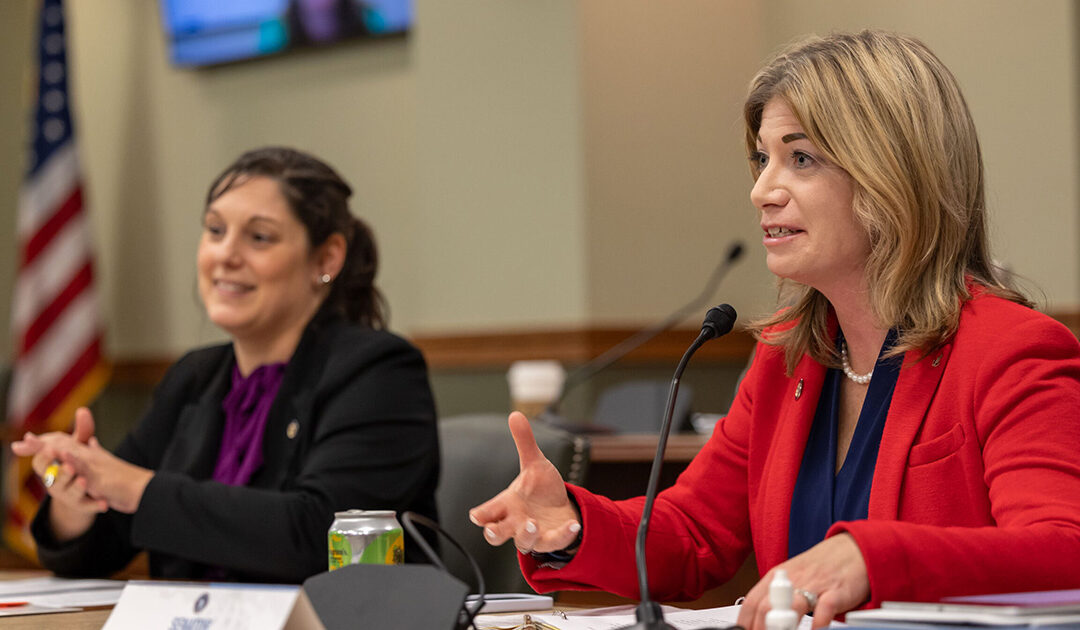HARRISBURG, September 26, 2024 – State Senator Katie Muth (D-Chester/Montgomery/Berks), chair of the Pennsylvania Senate Democratic Policy Committee, joined Senator Amanda Cappelletti (D-Montgomery) and Senator Judy Schwank (D-Berks) to host a public hearing on access to mail-in and absentee voting.
The hearing, held yesterday in the Pennsylvania State Capitol in Harrisburg, featured two panels of discussion that included perspectives from local government officials and voting rights advocacy groups highlighting the different election policies and procedures in place across the Commonwealth and how the state government can improve the process.
“The ability to cast a vote is one of the cornerstones of our democracy and I was grateful to have bipartisan participation in our Policy Committee hearing to highlight some of the ways we can make our elections more accessible, transparent, and efficient,” Muth said.
In May, the House of Representatives passed House Bill 847 by a party-line vote which would require a County Board of Elections to meet no earlier than 7 days prior to an election to pre-canvas all ballots received to that point. Under current law, counties can only begin pre-canvassing ballots at 7 a.m. on Election Day. The bill has now been stuck in the Senate State Government Committee for over four months.
“Yesterday’s hearing was a powerful discussion on how we can work together to remove barriers for both voters and county election workers during the mail in and absentee ballot process in the Commonwealth,” Sen. Cappelletti said. “My priority continues to be expanding access to the ballot, streamlining our election processes, and supporting the counties and poll workers that put in many diligent hours to ensure we have a free and fair election process here in the Commonwealth. Every eligible Pennsylvania voter deserves to be heard in this and every election.”
Testimony at the hearing also focused on current Pennsylvania law that disqualifies mail-in ballots if they have any one of several defects, including an incomplete voter declaration, missing signature, inaccurate date, or failure to use the secrecy envelope, or if they are received after 8 p.m. on Election Day. In the 2024 April primary, nearly 16,000 ballots from otherwise-eligible voters were disqualified.
“We want to ensure that Pennsylvania voters understand that mail-in ballots are a safe and convenient way to make their voices heard during elections. It’s also crucial for the legislature to partner with county governments responsible for administering our elections to guarantee an efficient process,” Sen. Schwank added. “Yesterday’s hearing not only allowed us to dispel some of the misinformation surrounding mail-in voting, but it also provided us with a better understanding of how the legislature can assist election administrators.”
Participants in the hearing included participants in the hearing include Krista Kerr, Deputy Director of Voter Services, Chester County; James Allen, Director of Elections, Delaware County; Lauren Cristella, President & CEO, Committee of Seventy; Jeff Reber, Union County Commissioner and Chair of the County Commissioners Association of Pennsylvania Election Reform Committee; and Philip Hensley-Robin, Executive Director, Common Cause Pennsylvania
“This hearing was an important reminder that our elections are fair, free, safe, and secure, and that mail-in ballots are a great way for voters to make their voices heard,” Senate Democratic Leader Jay Costa (D-Allegheny) said. “I look forward to continued conversations about expanding the freedom to vote encourage more Pennsylvanians to be voters in every election.”
Pennsylvania’s official voter information website is accessible at www.vote.pa.gov. The site also includes information about how to register to vote and how to register to vote by mail. If you have any questions about voting locally, click here for a full listing of all county election officials.
State Sen. Lindsey Williams (D-Allegheny) also participated in the hearing virtually.
For more information on this policy hearing and to access all submitted testimony and a full recording of today’s hearing, visit www.SenatorMuth.com/policy.
# # #
Testimony
Panel 1: Municipal Officials
- Krista Kerr – Deputy Director of Voter Services, Chester County [VIRTUAL]
- James Allen – Director of Elections, Delaware County
Panel 2: Policy Solutions

